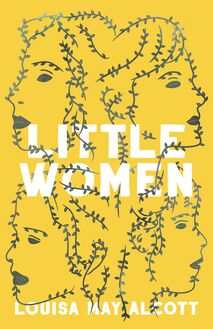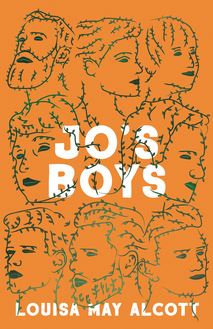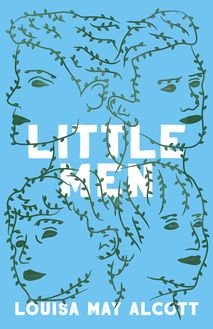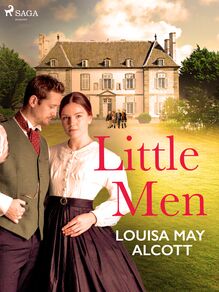-
 Univers
Univers
-
 Ebooks
Ebooks
-
 Livres audio
Livres audio
-
 Presse
Presse
-
 Podcasts
Podcasts
-
 BD
BD
-
 Documents
Documents
-
- Cours
- Révisions
- Ressources pédagogiques
- Sciences de l’éducation
- Manuels scolaires
- Langues
- Travaux de classe
- Annales de BEP
- Etudes supérieures
- Maternelle et primaire
- Fiches de lecture
- Orientation scolaire
- Méthodologie
- Corrigés de devoir
- Annales d’examens et concours
- Annales du bac
- Annales du brevet
- Rapports de stage
La lecture à portée de main
Vous pourrez modifier la taille du texte de cet ouvrage
Découvre YouScribe en t'inscrivant gratuitement
Je m'inscrisDécouvre YouScribe en t'inscrivant gratuitement
Je m'inscrisEn savoir plus
Vous pourrez modifier la taille du texte de cet ouvrage
En savoir plus

Description
Louisa May Alcott’s beloved children’s classic, Little Women, has captured the hearts of many generations since its original publication in 1868. Join sisters Meg, Jo, Beth and Amy as they find their feet in this charming coming-of-age story.
Each of the March sisters has big dreams: loving Meg wants to be an actress, wild Jo longs to be a writer, gentle Beth is a talented pianist, and precocious Amy is a gifted painter. But growing up in Civil War New England comes with responsibilities. When their father goes to war, the four sisters must set their dreams aside and work hard to support their Marmee.
In the midst of financial instability and worries for their father’s safety, the girls set about making their own fun, putting on plays and creating their own Pickwick Club. With some help from the boy next door, Laurie, Little Women is a classic page-turning adventure filled with fun and heartbreaking reality.
Read & Co. Classics is proud to have republished the March sisters’ timeless story, including both Little Women and its sequel, Good Wives, in this beautiful new edition. This coming-of-age novel is a perfect gift for the little women in your life.
Sujets
Informations
| Publié par | Read Books Ltd. |
| Date de parution | 11 octobre 2019 |
| Nombre de lectures | 5 |
| EAN13 | 9781528788410 |
| Langue | English |
| Poids de l'ouvrage | 1 Mo |
Informations légales : prix de location à la page 0,0500€. Cette information est donnée uniquement à titre indicatif conformément à la législation en vigueur.
Extrait
Little Women
By
LOUISA MAY ALCOTT
First published in 1868
This edition published by Read Books Ltd. Copyright © 2019 Read Books Ltd. This book is copyright and may not be
reproduced or copied in any way without
the express permission of the publisher in writing
British Library Cataloguing-in-Publication Data
A catalogue record for this book is available from the British Library
Contents
Louisa M ay Alcott
LITTLE WOMEN PART I
PLAYING PILGRIMS
A MERRY CHRISTMAS
THE LAU RENCE BOY
BURDENS
BEING N EIGHBORLY
BETH FINDS THE PALACE BEAUTIFUL
AMY'S VALLEY OF HU MILIATION
JO MEETS APOLLYON
MEG GOES TO VA NITY FAIR
THE P.C. AND P.O.
EX PERIMENTS
CAMP LAURENCE
CASTLES I N THE AIR
SECRETS
A TELEGRAM
LETTERS
LITTLE FAITHFUL
DARK DAYS
A MY'S WILL
CON FIDENTIAL
LAURIE MAKES MISCHIEF, AND JO MA KES PEACE
PLEASAN T MEADOWS
AUNT MARCH SETTLES THE QUESTION
LITTLE WOMEN PART II
GOSSIP
THE FIRS T WEDDING
ARTISTIC ATTEMPTS
LITERAR Y LESSONS
DOMESTIC EX PERIENCES
CALLS
CON SEQUENCES
OUR FOREIGN CORR ESPONDENT
TENDER TROUBLES
JO' S JOURNAL
FRIEND
HEARTACHE
BETH 'S SECRET
NEW IM PRESSIONS
ON THE SHELF
LAZY LAURENCE
THE VALLEY OF T HE SHADOW
LEARNING TO FORGET
ALL ALONE
SURPRISES
MY LORD AND LADY
DAISY AND DEMI
UNDER THE UMBRELLA
HAR VEST TIME
Louisa May Alcott
Louisa May Alcott was an American Novelist, best known for the classic Little Women (1868) and its sequels Little Men and Jo’s Boys. Alcott was born on 29 November, 1832 in Germantown, Pennsylvania, USA, and was raised by her transcendentalist parents. The family, despite their connections with the American intellectual elite, suffered severe financial hardship and Alcott frequently helped to support the household. In 1840, after several financial setbacks, most notably following the experimental school set up by Louisa May’s father, the family moved to a cottage along the Sudbury River in Massachusetts. In 1843, the family moved again to the Utopian Fruitlands Community , an agrarian commune, dedicated to natural living. They finally settled in a house they named Hillside in 1845. As a result of this peripatetic childhood, Alcott’s schooling was mainly received from her father, who was an incredibly strict disciplinarian, high thinker and advocate of plain living. This instilled a determination and strong work ethic in Alcott, who worked as a teacher, governess, seamstress and writer in her early years. As an adult, Alcott was a strong abolitionist and a feminist advocate, becoming the first woman to register to vote in Concord, in a school board election. During the civil war, Alcott worked as a nurse in the Union Hospital at Georgetown, D.C. She collected all her letters, often dryly humorous, in book entitled Hospital Sketches (1863); a work which brought Alcott critical acclaim. Following on from this success, Alcott wrote several novels under the pen name A. L. Barnard, most notably A Long Fatal Love Chase (1866) and A Modern Mephistopheles (1875). However, Little Women and its sequels were Alcott’s major successes; the first book dealt with the childhood of Meg, Jo, Beth and Amy; characters strongly based on Alcott’s childhood accompanied by her own three sisters. The sequel, Good Wives (1869) dealt with their progression into adulthood, whilst Little Men (1871) detailed Jo’s life at the school she founded alongside her husband. Jo’s Boys (1886) completed the ‘Family Saga’. The Character Jo was loosely based on Alcott’s own life, however unlike the heroine, Alcott never married, commenting that ‘I am more than half-persuaded that I am a man's soul put by some freak of nature into a woman's body ... because I have fallen in love with so many pretty girls and never once the least bit with any man.’ Alcott was firmly part of the Gilded Age , along with authors such as Elizabeth Stoddard and Rebecca Harding Davis, she addressed women’s issues in a modern and candid manner. Alcott continued to write until her death on 6 March, 1888. The cause of death is uncertain; she suffered chronic health problems, including vertigo and typhoid, the latter of which was treated with mercury. However recent analysis of her illnesses has suggested an autoimmune disease such as Lupus. She is buried in Sleepy Hollow Cemetery, Concord, Massachusetts, on a hillside known as Author ’s Ridge.
Four little chests all in a row, Dim with dust and worn by time, All fashioned and filled long ago By children now in their prime. Four little keys hung side by side, With faded ribbons, brave and gay When fastened there with childish pride Long ago on a rainy day. Four little names, one on each lid, Carved out by a boyish hand; And underneath there lieth hid Histories of the happy band Once playing here, and pausing oft To hear the sweet refrain That came and went on the roof aloft In the falling summer rain. Four little chests all in a row, Dim with dust and worn by time: Four women, taught by weal and woe To love and labor in their prime; Four sisters parted for an hour,– None lost, one only gone before, Made by love's immortal power Nearest and dearest evermore. Oh! when these hidden stores of ours Lie open to the Father's sight, May they be rich in golden hours,– Deeds that show fairer for the light, Deeds whose brave music long shall ring Like a spirit-stirring strain, Souls that shall gladly soar and sing In the long sunshine, after rain.
LITTLE WOMEN PART I
CHAPTER ONE
PLAYING PILGRIMS
"Christmas won't be Christmas without any presents," grumbled Jo, lying on the rug.
"It's so dreadful to be poor!" sighed Meg, looking down at her o ld dress.
"I don't think it's fair for some girls to have plenty of pretty things, and other girls nothing at all," added little Amy, with an injur ed sniff.
"We've got Father and Mother, and each other," said Beth contentedly from he r corner.
The four young faces on which the firelight shone brightened at the cheerful words, but darkened again as Jo said sadly, "We haven't got Father, and shall not have him for a long time." She didn't say "perhaps never," but each silently added it, thinking of Father far away, where the figh ting was.
Nobody spoke for a minute; then Meg said in an altered tone, "You know the reason Mother proposed not having any presents this Christmas was because it is going to be a hard winter for everyone; and she thinks we ought not to spend money for pleasure, when our men are suffering so in the army. We can't do much, but we can make our little sacrifices, and ought to do it gladly. But I am afraid I don't," and Meg shook her head, as she thought regretfully of all the pretty things sh e wanted.
"But I don't think the little we should spend would do any good. We've each got a dollar, and the army wouldn't be much helped by our giving that. I agree not to expect anything from Mother or you, but I do want to buy Undine and Sintran for myself. I've wanted it so long," said Jo, who was a bookworm.
"I planned to spend mine in new music," said Beth, with a little sigh, which no one heard but the hearth brush and kettl e-holder.
"I shall get a nice box of Faber's drawing pencils; I really need them," said Amy d ecidedly.
"Mother didn't say anything about our money, and she won't wish us to give up everything. Let's each buy what we want, and have a little fun; I'm sure we work hard enough to earn it," cried Jo, examining the heels of her shoes in a gentlemanl y manner.
"I know I do—teaching those tiresome children nearly all day, when I'm longing to enjoy myself at home," began Meg, in the complaining to ne again.
"You don't have half such a hard time as I do," said Jo. "How would you like to be shut up for hours with a nervous, fussy old lady, who keeps you trotting, is never satisfied, and worries you till you're ready to fly out the window or cry?"
"It's naughty to fret, but I do think washing dishes and keeping things tidy is the worst work in the world. It makes me cross, and my hands get so stiff, I can't practice well at all." And Beth looked at her rough hands with a sigh that any one could hear t hat time.
"I don't believe any of you suffer as I do," cried Amy, "for you don't have to go to school with impertinent girls, who plague you if you don't know your lessons, and laugh at your dresses, and label your father if he isn't rich, and insult you when your nose isn 't nice."
"If you mean libel, I'd say so, and not talk about labels, as if Papa was a pickle bottle," advised Jo, laughing.
"I know what I mean, and you needn't be statirical about it. It's proper to use good words, and improve your vocabilary," returned Amy, with dignity.
"Don't peck at one another, children. Don't you wish we had the money Papa lost when we were little, Jo? Dear me! How happy and good we'd be, if we had no worries!" said Meg, who could remember bett er times.
"You said the other day you thought we were a deal happier than the King children, for they were fighting an
-
 Univers
Univers
-
 Ebooks
Ebooks
-
 Livres audio
Livres audio
-
 Presse
Presse
-
 Podcasts
Podcasts
-
 BD
BD
-
 Documents
Documents
-
Jeunesse
-
Littérature
-
Ressources professionnelles
-
Santé et bien-être
-
Savoirs
-
Education
-
Loisirs et hobbies
-
Art, musique et cinéma
-
Actualité et débat de société
-
Jeunesse
-
Littérature
-
Ressources professionnelles
-
Santé et bien-être
-
Savoirs
-
Education
-
Loisirs et hobbies
-
Art, musique et cinéma
-
Actualité et débat de société
-
Actualités
-
Lifestyle
-
Presse jeunesse
-
Presse professionnelle
-
Pratique
-
Presse sportive
-
Presse internationale
-
Culture & Médias
-
Action et Aventures
-
Science-fiction et Fantasy
-
Société
-
Jeunesse
-
Littérature
-
Ressources professionnelles
-
Santé et bien-être
-
Savoirs
-
Education
-
Loisirs et hobbies
-
Art, musique et cinéma
-
Actualité et débat de société
- Cours
- Révisions
- Ressources pédagogiques
- Sciences de l’éducation
- Manuels scolaires
- Langues
- Travaux de classe
- Annales de BEP
- Etudes supérieures
- Maternelle et primaire
- Fiches de lecture
- Orientation scolaire
- Méthodologie
- Corrigés de devoir
- Annales d’examens et concours
- Annales du bac
- Annales du brevet
- Rapports de stage










